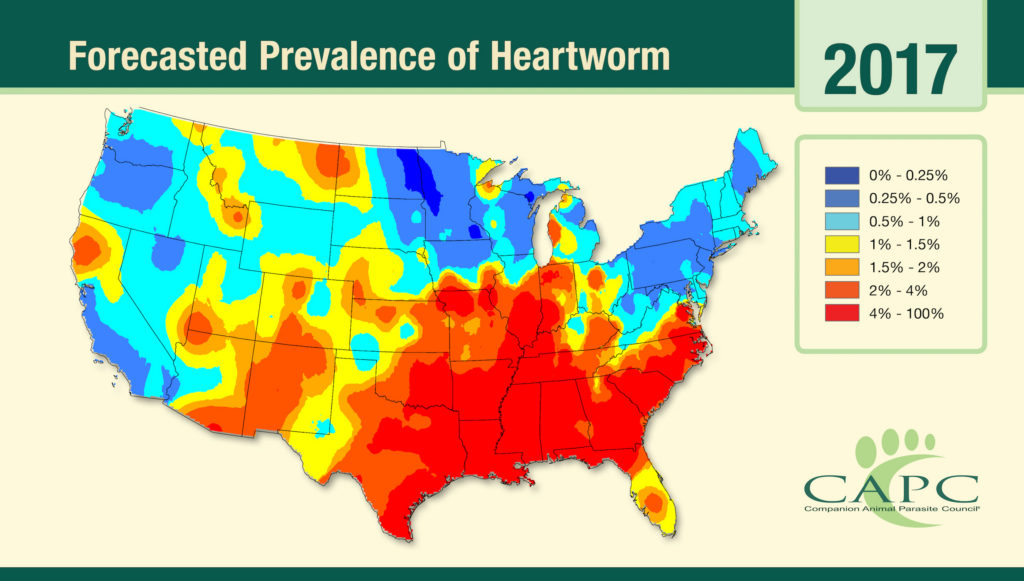Council Cites Research in Minimizing Danger to Dogs from Heartworm Disease
As inquiries about mosquito-borne diseases in dogs increase and the veterinary profession is introduced to compelling new research on fighting heartworm in dogs, Ceva Animal Health congratulates the Companion Animal Parasite Council (CAPC) on the decision to add its first-ever set of guidelines on mosquito control. Issued in mid-April, the new guidelines focus on the treatment, control and prevention of a host of serious problems related to mosquitoes. The importance of controlling the vector – the mosquito – is the highlight of the guidelines, supported by a “double defense” protocol to #FightHeartworm disease in dogs.
Heartworm infections are a significant health risk to dogs as even light infections are capable of producing profound pulmonary vascular, airway and interstitial disease. Despite improved diagnostic methods, effective preventives and increasing awareness among veterinary professionals and pet owners, cases of heartworm infection continue to be diagnosed in high numbers. According to the CAPC Parasite Prevalence Maps, in 2016 over 118,000 cases of canine heartworm were diagnosed in the United States. Heartworm infections are becoming more prevalent in areas previously considered to be at a low risk (see Heartworm disease in CAPC guidelines). In response, the guidelines recommend an “Integrated Pest Management (IPM)” strategy. “IPM employs the use of EPA-registered repellents/insecticides on the pet and humans, minimizing exposure, and altering the environment to discourage mosquito growth development.”
In response, the guidelines recommend an “Integrated Pest Management (IPM)” strategy. “IPM employs the use of EPA-registered repellents/insecticides on the pet and humans, minimizing exposure, and altering the environment to discourage mosquito growth development.”
Repelling and killing the vector, the mosquito, should be a part of this strategy to protect canines. “There are several products available for use on dogs to repel and kill mosquitoes for an entire month,” the guidelines continue. “Several of these products are labeled to control other ectoparasites as well. Recent research indicates that treatment of dogs with a combination of dinotefuran, permethrin and pyriproxyfen (Vectra® 3D for Dogs labeled to kill and repel fleas, ticks, mosquitoes), inhibits uptake of heartworm microfilariae from infected dogs and prevents transmission of heartworm infective larvae from infected mosquitoes to non-infected dogs.”
CAPC refers to groundbreaking research conducted by John McCall, MS, PhD, a professor emeritus in the Department of Infectious Diseases at the University of Georgia College of Veterinary Medicine. (See the full details on the design and results of the studies at FightHeartwormNow.com.) In two phases of the study, Dr. McCall showed the value of topical repellent insecticidal products in a “double defense” protocol for protecting dogs against the vector – the mosquito – and use of a preventive against heartworm disease. His research found that Vectra® 3D for Dogs, by repelling and killing mosquitoes that may transmit the disease, adds an extra layer of protection along with the heartworm preventive.

Byron Blagburn, MS, PhD, DAVCM, Parasitology Professor, Researcher and Author of the CAPC Mosquito Control Guidelines
Dr. McCall’s research validates the “double defense” approach in protecting and preventing heartworm disease from the outside and the inside, says Byron Blagburn, MS, PhD, DAVCM, noted parasitology professor, researcher and author of the mosquito control guidelines.
“Science demands that we shouldn’t presume anything until we prove it. This research makes it legitimate that mosquito control is important. I would venture to say that there’s not an example of more relevant research in the last five years,” says Dr. Blagburn.
Dr. Blagburn adds that the guidelines emphasize using both a topical repellent with a macrocyclic lactone preventive since there’s no area immune from parasites. “First, there is no state that is free of heartworm disease or lacks capable and supportive vectors. Therefore, the argument that double defense has no place in certain areas is invalid.”
“The veterinary community has always been focused on killing the disease after it occurs,” adds Craig Prior, BVSC, CVJ, president of CAPC and previous owner and medical director of VCA Murphy Road Animal Hospital, an eight-doctor practice in Nashville, Tenn. “If we can go after the mosquito as well, we can be more effective.”

I. Craig Prior, BVSc, CVJ, President of Companion Animal Parasite Council (CAPC)
“This is revolutionary because Dr. McCall’s research proved that there’s a better approach in preventing heartworm disease in dogs by combining a topical repellent with a macrocyclic lactone preventive. It’s broken new ground in heartworm protection and prevention. And as veterinarians, we know the value of a multimodal approach, which we follow in other areas such as osteoarthritis and weight loss,” Dr. Prior adds.
The new Mosquito Control Guidelines come on the heels of the Council’s update to its Control and Prevention section of its Canine Heartworm Guidelines last October. CAPC included the statement that “limiting contact with mosquitoes further reduces risk of heartworm infection.” In addition, CAPC cites although the “slow-kill” method should be avoided, if it is the only medically acceptable option, microfilariae should be eliminated prior to the exposure to preventive doses of macrocyclic lactones and dogs should be maintained on a mosquito repellent.
Dr. Prior says the veterinary community wanted even more guidance on mosquito control. “We knew we wanted to go after the vector. We are the experts on this so we wanted to keep up with the latest in scientific medicine,” he notes.
“The addition of the Mosquito Control Guidelines, along with last year’s update to the Canine Heartworm Guidelines, further supports CAPC’s mission of supporting the veterinary community and pet-owning public in the fight against parasites,” says Craig Wallace, Chief Executive Officer, Ceva Animal Health. “CAPC’s guidelines further validate Dr. McCall’s recommendation to fight both the vector and heartworm disease by using a multimodal approach that protects dogs from the serious and often deadly consequences of heartworm disease.”
About Ceva Animal Health, LLC: Ceva Animal Health’s portfolio of companion animal products includes the Vectra® and Catego™ lines of parasiticides, the pheromone products Adaptil® and Feliway®, Douxo® dermatology products, and TRP-Tri-COX® . The company’s North American headquarters is in Lenexa, Kansas. Visit www.ceva.us.
About Ceva Santé Animale S.A: Ceva’s parent company is a global veterinary health company focused on the research, development, production and marketing of pharmaceutical products and vaccines for pets, livestock, swine and poultry.
Do not use Vectra® 3D on cats.

